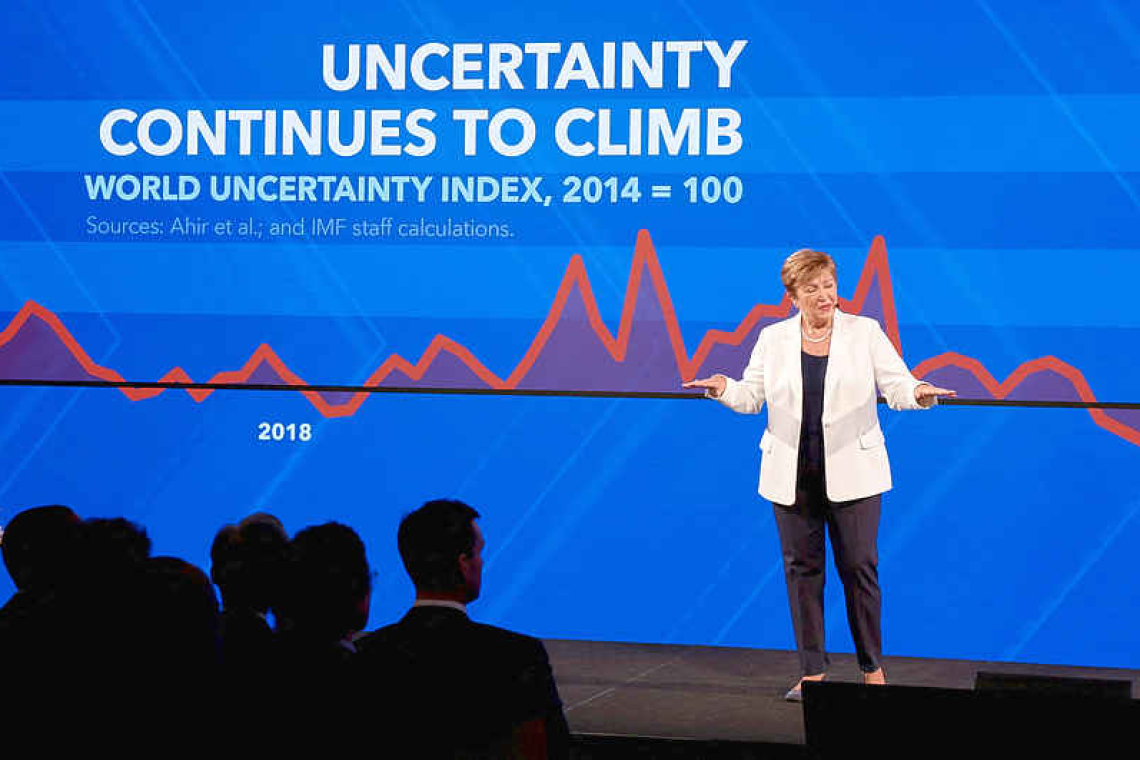WASHINGTON--The world economy has proven more resilient than expected despite acute strains from multiple shocks, the head of the International Monetary Fund said on Wednesday, forecasting only a slight slowing of global growth this year and in 2026.
IMF Managing Director Kristalina Georgieva said recent economic data showed a softening in the U.S. economy, but it had dodged a recession feared by many experts just six months ago.
The U.S. economy and many others had held up, given better policies, a more adaptable private sector, less severe import tariffs than feared - at least for now - and supportive financial conditions, she told an event hosted by the Milken Institute in Washington. "We see global growth slowing only slightly this year and next. All signs point to a world economy that has generally withstood acute strains from multiple shocks," Georgieva said in a preview of the IMF's upcoming World Economic Outlook to be released next Tuesday during the annual meetings of the IMF and the World Bank.
In July, the IMF raised its global growth forecast by 0.2 percentage point to 3.0% for 2025 and by 0.1 percentage point to 3.1% for 2026. Georgieva told Reuters in an interview the fresh outlook would reflect a small downward revision from the 3.2% growth forecast last October, but gave no exact numbers.
"What we are seeing is demonstrable resilience in the world," she said. "But we are also saying it is a time of exceptional uncertainty and downside risks are still dominating the forecast. So watch it, don't get too comfortable."
Next week's gathering takes place at a time when President Donald Trump has upended global trade with steep tariffs and cracked down on immigration, and artificial intelligence is rapidly transforming technology and the outlook for labour.
The world economy is doing "better than feared, but worse than needed," Georgieva said in her speech, noting the IMF was forecasting global growth of roughly 3% over the medium-term, well below the 3.7% forecast before the COVID-19 pandemic.
She cited deep undercurrents of marginalization, discontent and hardship around the world, and said the global economy faced an array of risks, including a potential market bubble around artificial intelligence.Uncertainty is at exceptionally high levels and continuing to climb, while demand for gold - a traditional safe-haven asset - is surging, Georgieva said.
Gold hit another record high on Wednesday, surging past $4,000 an ounce for the first time, as a U.S. government shutdown persisted and expectations for a Fed rate cut this month boosted demand. She said the IMF saw scope for further monetary easing this year.
Georgieva said the U.S. tariff shock has been less severe than initially announced in April, with the U.S. trade-weighted tariff rate now around 17.5%, down from 23% in April, and countries largely skipping retaliatory tariffs.But U.S. tariff rates keep changing and U.S. inflation could rise if companies started to pass through more of the cost of tariffs, or if a flood of goods previously headed for the U.S. triggered a second round of tariff hikes elsewhere, she said.
Financial market valuations are also heading toward levels last seen during the internet-related bullishness 25 years ago, she said. An abrupt shift in sentiment - such as what happened during the dot.com crash of March 2000 - could drag down world growth, making life especially tough for developing countries.
"Buckle up," Georgieva said, adding, "Uncertainty is the new normal and it is here to stay."
The IMF head urged countries to durably lift growth by boosting private-sector productivity, consolidating spending, reducing debt and tackling excessive current account imbalances, which would help rebuild their buffers for the next crisis."As we have seen, these imbalances can trigger a protectionist backlash and - being mirrored by net capital flows - can fuel financial stability risks," she said. "We at the IMF are working hard to refine our external sector assessments and will keep pushing key players for policy correctives."
Global public debt is expected to exceed 100% of GDP by 2029, Georgieva said.Competition is key, along with free-market-friendly property rights, rule of law, strong financial sector oversights and accountable institutions.







